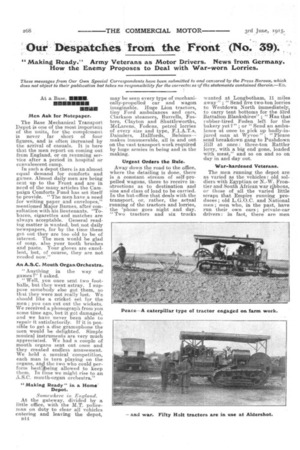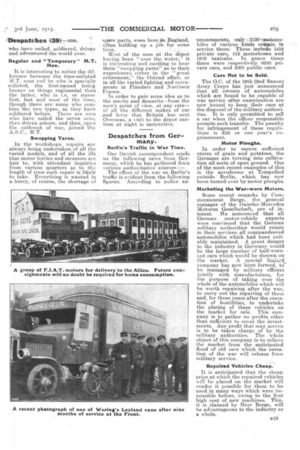Our Despatches from the Front . (No. 39).
Page 4

Page 5

If you've noticed an error in this article please click here to report it so we can fix it.
"Making Ready." Army Veterans as Motor Drivers. News from Germany. How the Enemy Proposes to Deal with War-worn Lorries.
These messages from Our Own Special Correspondents have been submitted to and censored by the Press Bureau, which does not object to their publication but takes no responsibility for the correctness of the statements contained therein,—ED.
Men Ask I or Notepaper.
The Base Mechanical Transport Depot is one of the most important of the units, for the complement is never far short of four figures, and is often increased by the arrival of casuals. It is here that the men report on coming out
from England, or on in service after a period n hospital or convalescent camp.
In such a depot there is an almost equal demand for comforts and games. Almost daily men are being sent up to the Front and are in need of the many articles the Campaign Comforts Fund has set itself to provide. "The men have a need for writing paper and envelopes," mentioned Major Barnes, after consultation with his lieutenants. "Tobacco, cigarettes and matches are always acceptable. General reading matter is wanted, but not daily newspapers, for by the time these get out they are too old to be of interest. The men would be glad of soap, also your tooth brushes and paste. Your gloves are excellent, but, of course, they are not needed now."
An A.S.C. Mouth Organ Orchestra.
"Anything in the way of games ?" I asked.
"Well, you once sent two footballs, but they went astray. I suppose somebody else got them, so that they were not really lost. We should like a cricket set for the men ; you can cut out the wickets. We received a phonograph from you some time ago, but it got damaged, and we have never been able to repair it satisfactorily. If it is possible to get a disc gramophone the men would be delighted. Simple musical instruments are very much appreciated. We had a couple of mouth organs sent •out once and they created endless amusement. We hold a musical competition, each man in turn playing on the organs, and the two who could perform best'14aeing allowed to keep them. In time we might rise to an A.S.C. mouth-organ orchestra."
"Making Ready" in a Home. Depot.
Somewhere England. At the gateway. divided by a little office, with the M.T. policeman on duty to clear all vehicles entering and leaving the depot, may be seen every type of mechanically-propelled car and wagon imaginable. Huge Lion tractors, tiny Ford ambulances and cars, Clarkson steamers, Burrells, Fosters, Clayton and Shuttleworths, McLarens, Fodens, petrol lorries of every size and type, F.I.A.T.s, Daimlers, Hallfords, Belsizesmakes innumerable, all in and out on the vast transport work required by huge armies in being and in the making.
Urgent Orders the Rule.
Away down the road to the office, where the detailing is done, there is a eonstant stream of self-propelled wagons, there to receive instructions as to destination and size and class of load to be carried. In the hut-office that deals with the transport, or, rather, the actual running of the tractors and lorries, the 'phone gees night and day. "Two tractors and six trucks wanted at Longbotham, 11 miles away " ; "Send five two-ton lorries to Westdown. North immediately, to carry tent bottoms for the 53rd Battalion Blankshires" ; "Has that rubber-tired Foden left for the bakery yet ? " ; or "Send an ambulance at once to pick up badly-injured man at Wyvoe " ; "Please send breakdown gang to Pushdown Hill at once : three-ton Rattler lorry, with a big end gone, loaded with meat," and so on and SO on day in and day out.
War-hardened Veterans.
The men running the depot are as varied as the vehicles old soldiers with Egyptian or N.-W. Frontier and South African war ribbons, or those of all the varied little scraps that Empire running produces; old L.G.O.C. and National men; men who, in the past, have run their. own cars ; private-car drivers : in fact, there are men who have sailed, soldiered, driven and ad-ventured the world over.
Regular and "Temporary" M.T. Men.
It is interesting to notice the difference between the time-enlisted M.T. man and he who is specially enlisted, the first-named being keener on things regimental than the latter; who is i.e. or steam first, last and most of the time, though there are many who combine the two types, as they have .soldiered before. There are men who have sailed the seven seas, then driven ashore, and then, upon the outbreak of war, joined the A.S. C. , M. T.
Swopping Yarns.
In the workshops, rcipa.irs are always being undertaken of all the varied models, and of all the ills that motor lorries and steamers are heir to, with attendant inquiries from various quarters as to the length of time each repair is likely to take. Everything is wanted in a hurry; of course, the shortage of
spare parts, even here in England, • often hording up a jf)b for some time: • – Most of the men at the depot having been " over the water," it is interesting and exciting to hear them "swopping yarns" as to their experiences either in the "great retirement," the Ostend affair, or in all the varied fighting and movements in Flanders and Northern France.
In order to gain some idea as to the inefits and demerits—from the men's point of view, at any rate— of all the different makes of car and lorry that Britain has sent Overseas, a visit to the depot canteen at night is instructive.
Despatches from Germany.
Berlin's Traffic in War Time.
Our Danish correspondent sends us the following news from Germany, which he has gathered from various authoritative sources :—
The effect of the war on Berlin's traffic is evident from the following figures. According to police an nouncements, only 3130.14auton2obiles of various %kinds remain in service there. These include 1418 private cars, 112 motorbuses and 1600 taxicabs. In peace times there were respectively 6243 private cars, and 2300 public ones.
Cars Not to be Sold.
The 0.0. of the 19th (2nd Saxon) Army Corps has just announced that all owners of automobiles which are found to be capable of war service after examination are now bound to keep their cars at the disposal of the military authorities. It is only permitted to sell a car when the officer responsible permits such transfer. The penalty for infringement of these regulations is 250 or one year's imprisonment.
Motor Ploughs.
In order to secure sufficient stores of grain and potatoes, the Germans are turning into cultivation all sorts of open ground. One of the most recent examples of this is the aerodrome at Tempelhof outside Berlin, which has now been turned over by motor ploughs.
Marketing the War-worn Motors.
Some recent remarks by Cornmerzienrat Berge, the general manager of the Daimler-Mercedes Motoren Gesellschaft, are of interest. He announced that all German motor-vehicle experts were convinced that the German military authorities would retain in their services all commandeered automobiles which had been suitably maintained. A great danger to the industry in Germany would be the large number of half-wornout cars which would be thrown on the market. A special limited company has now been formed, to be managed by military officers jointly with manufacturers, for the purpose of taking over the whole of the automobiles which will be worth repairing after the war, to carry out the repairing of them and, for three years after the cessation of hostilities, to undertake the placing of these vehicles on the market for sale. This company is to gather no profits other than sufficient to cover the investments. Any profit that may accrue is to be taken charge of by the military authorities. The whole object of this company is to relieve the market from the anticipated flood of old cars which the cessation of the war will release from military service.
Repaired Vehicles Cheap.
It is anticipated that the cheap price at which the repaired vehicles will be placed on the market will render it possible for them to be used in many ways which were impossible before, owing to the first high cost of new machines. This, it is claimed by Herr Berge, will be advantageous to the industry as a whole.




















